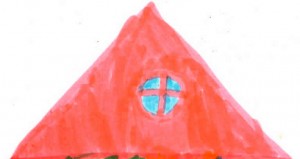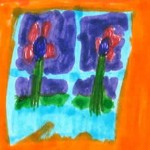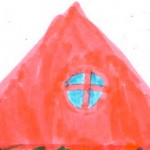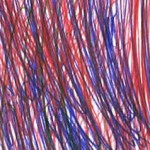Thin House (working title) is a sort of collaboration where I (Patrick) am writing the screenplay of the novel (by Josephine) with consultation from the author. So far, what we have is a polished 15 minute script of a small part of the novel. We’re working on spec to find someone to make a short film, and have our minds on a full-length screenplay, too. See our dialogue about the adaptation process…Dialogue between a scriptwriter & novelist
Dear Patrick,
I often felt discomforted by the original title for the novel (‘Bye, Bye the Appler’) especially if I was speaking about it to someone for the first time. It was a conversation stopper. The mutation into ‘Welcome to midnight’ was better but was still did not suggest the territory strongly enough . ‘Thin House’ – words which appear in the novel and your choice of title for your screenplay – does do this and has led me in the rewriting of the novel (post your screenplay of it) to change it to this. Ari, the main character, is a woman at sea, trying desperately to gather her thin walls to herself. She escapes from her marital home and tries to keep outside forces at bay, particularly those that would put her daughter under scrutiny for ‘odd’ behaviour, but of course, she fails to keep these out.
A sense of her invasion from all angles is what is central to the novel, I think. Your adaptation distills this idea, much better, I feel than I achieved in the fiction. As a screenplay the bagginess of writing falls away and the eeriness is intensified. Your work did offer a way back in for me to rewrite the book.
Josephine
Dear Josephine,
I guess the problem with the novel’s original title was that it did require explanation. Film adaptations often lose the original title. Thus, The Turn of the Screw (a great title) became The Innocents – as a more literal signpost of the story’s theme.
The sense of escape is quite strong in the novel. What I’ve responded to thus far is the sense of aloneness that this escape necessarily creates. One of the reasons I chose focus on the scene in the house is because the notion of an empty, especially (almost in this case) abandoned house has a powerful quality. When I was a kid I spent a lot of time in an abandoned house down a dirt road. I knew the old guy that had lived there, and even though the house was completely abandoned there was always a sense of invading this guy’s psychic space when I went there. I literally and metaphorically expected his ghost to enter the room at any time. And when I sleep-walked at night I was always terrified that I’d wake up there.
One of the things that makes the idea so strong here in terms of the eeriness is that the presence of Lucinda actually heightens the sense of aloneness rather than reduces it. This is partly because she is a child, but also because she is unknowable. This story responds very deeply to Freud’s concept of The Uncanny, where the Homely (Heimliche) is made Unheimliche (uncanny) by that one detail which does not belong.
Patrick.
Dear Patrick,
The image of the sleepwalker is something to which we are clearly both attracted. This mysterious figure which straddles sleep and waking life has haunted the writing of the novel for me. A number of times I have been frightened by my sleepwalking son suddenly appearing in my study while I was up late working on the novel. The terror you felt as a child that you might wake up in the abandoned house you describe is a chilling thought and it makes me wonder (now that I am the dead author of this novel and so take my place as a guest at its reading) at the character of Ari who has deliberately chosen to wake up in such a place.
In the early 90s I came upon the Russian philosopher PD Uspenski and his writings about sleep and waking life: the idea that we are continually dreaming and the reason we are not so aware of our dreams during the day is akin to being able to see stars from the bottom of a well. At the bottom of the well we are removed from the sensory distraction of light. Likewise in the day, we are less aware of our dreams because of the influx of sensory distractions, noise, speech, traffic, air conditioning. The way that cultures other than the West place give more precedence to ‘dream life’ has long been a fascination for me and emerges in all the different kinds of writing I do, including the novel.
When I was writing the novel I was trying to emulate ( in the structure as well as the content) the sense of drifting in and out of dream/ sleep. The novel did begin all those years ago with a series of images from a few disparate dreams, which I then investigated a la Kundera (Kundera in The Art of the Novel speaks about novels as being based on key words which are investigated throughout the course of the narrative). Ari is a character whose boundaries between sleep and waking have become really blurred. This idea is something that you distilled beautifully in the adaptation: Ari is often weary, tired, loses concentration. The fact that she drifts in and out of sleep becomes pivotal in the action eg Lucinda can disappear under the house because Ari is just not ‘present’.
Josephine.
Dear Josephine,
It’s curious that we seem to have slipped into preordained roles as novelist strong on theory, scriptwriter strong on nuts and bolts. We do need to incorporate the theory into this project (even in a post theory sort of way – it’s still significant in how you wrote the novel and fun for me to try to incorporate). My feeling is that the best way to do this is for my research angle to be on adaptation and yours to be on the stuff you’re already doing (or have already done really).
The tiredness of child rearing is of course something I can’t relate to…ha ha. But seriously, that trope of the blurring of sleep and waking is an interesting challenge to work with. This is a very liminal story – dream/waking, aloneness/responsibility, inside/outside etc.
I also think that – accidentally – I’m evoking Bachelard with the stuff under the house. Bachelard’s whole construction of the house as a poetic space relies on the idea that a house is vertical space. Clearly this is a very European construction, not an Australian one, but here perhaps that verticality manifests as an absence. I guess more significant though is the tenuousness of the limen between inside and out that Ari is so aware of. Would you agree that this is one of the things that constructs her as a character? Anyway, this is how the rupture manifests for me – I’m less attuned to the need for self-definition than to the need to create a clear space around me (hence waiting till everyone is asleep before I can doing anything vaguely creative…).
Patrick
Dear Josephine,
I’m doing some theoretical reading to begin with. But perhaps you could elaborate some more on what you were/are trying to do with the novel. What are you attempting to communicate to an audience?
Patrick.
Dear Patrick,
I think the element of aloneness you describe in our initial correspondence is pivotal in what I was trying to communicate to my audience. I think the frustration Ari’s ex husband feels towards to her centres upon his perception of her as choosing to be alone.
I needed to send Ari off to that kind of space – the ‘haunted’ house – in order for me to try to distill her experience of motherhood. I wanted to capture the ambivalence (ambivalence as it is understood in its coinage by psychoanalysis – strong conflicting feelings – rather than the more watery usage today which suggests mixed feelings) that a woman might experience upon becoming a mother, and here in Ari’s case, how this experience is intensified when the child seems not to be adapting in the typical way. I wanted to explore the grey areas of diagnosis as a challenge to the diagnostic categories which have proliferated in the past decade or so, and has parents running to seek psychological help at every turn. I was hoping also that by having Lucinda present as unusual or seeming to have a disability, I could amplify and then distill the everyday concerns of any parent with a child who was not so unusual. Much of what we understand about typically adapting children is drawn from research of atypically adapting children.
I wanted to convey a sense that away from the outside gaze, perhaps mother and child were doing okay – that they had formed their relationship on their own terms … children don’t entertain concepts of their parents being ‘good’ or ‘bad’, particularly a child as young as Lucinda. Mikhail Baktin’s writing about the formation of self provided a creative jumping off point…which I think is sound – about parents forming an orienting figure in the landscape for children…we at least know this… and Freud wrote about the object disappearing and its reappearance …reality testing stuff.
So, this idea of children seeing their parents as landmarks, orienting figures in their landscape intrigued me. We cannot penetrate the mind or workings of a child who is, for example, autistic (because essentially their relationship to language is unknowable). I guess I wanted to open up the category of love… we can’t apply a blanket meaning for what love is or how a child experiences it.
I see Ari as a character who has been thrown off kilter: Lucinda has plummeted her out of time and over the course of the novel Ari is trying to reinvent her ground…or in Joseph Campbell’s writing – the idea that heroes need to die from the world in order to (re(emerge). Artists have to die from the world in order to get their writing done, and emerge as different people, I think, after the process. There is a short story in Best Aust stories by Karen Hitchcock called ‘Little white slip’ which charts very powerfully a woman’s sense of dislocation and alienation concerning new motherhood. I’m not sure if there were many, if any, novelists charting maternal ambivalence in the way I was trying to at the time – the early millenium. But certainly it has emerged more recently in the likes of the above short fiction (a number of my students reacted against the character of the mother in Hitchcock’s story because it offended their romantic maternal ideals).
I think your adaptation allowed Ari to truly become a character. I think some readers might find her unlikeable in the novel. I wonder how they would her in your script? You pushed her behaviour – made her more alone, more out time, more honest.
Again, when I read over what you were writing about the abandoned house you used to visit as a child I find it a powerful image. The pull towards a liminal world beyond our perception is a powerful one…The house in the novel had so many cracks, so many holes, which again you amplified in the screenplay and so the walls of the house are like a cracked skin…Ari and Lucinda might get swallowed up or lost in their own minds being in such a space.
Why am I drawn to crumbling houses as a subject? My memories of my grandmother’s two-storey terrace house in Kensington, Melbourne is large in my memory as a site of unconditional love for me when I was a child. Yet it was a spooky old place, and apparently had hosted a couple of murders in its time as a boarding house, before my grandparents bought it in the 1950s. I remember feeling both utterly safe and also frightened at this house. I have memories of standing on the landing on the staircase at night gazing through the window looking across the rooftops and (imagining?) I could hear the sounds of the nearby port …and feeling a sense of desolation. I used to make up ghost stories set in the house and terrify my younger cousins with them at bedtime.
My arms are getting numb! So I guess what I am saying here is that there is a dichotomy – the place that was safest for me happened to be a haunted space which also scared me. And if I can go further into memory, I think I must have been terrified of loss as a child – I had recurring nightmares of the land tipping, driveways mutating and becoming rollercoaster like, with me on one side, my family on the other. I don’t know why I was like this. Maybe I was just over-sensitive, having a heightened sense of my own fragility as a human being, against which I have always found it hard to cushion myself.
Heterotopias are something to explore -these and Freud’s Uncanny as you suggest.
Josephine.








